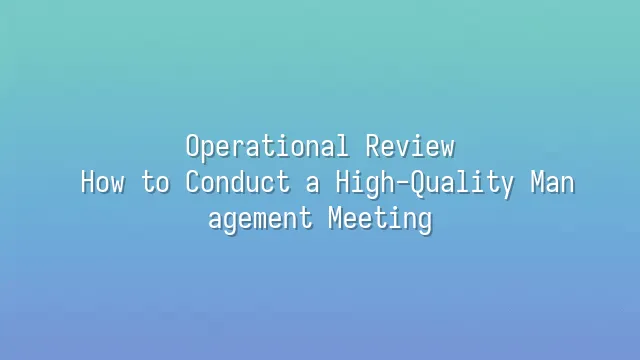
Refresh
An effective management meeting should not merely be a "reporting session," but should serve decision-making and strategic advancement.
An effective management meeting = Clear objectives + High-quality data summaries + Focused discussion on key issues + Clear conclusions + Strong execution tracking
Traditional management meetings often turn into all-day reporting sessions for leadership:
● Reporting on KPI achievement status
● Reading verbatim the work completed in the previous cycle
● Highlighting a few "wins" and "challenges"
● Clapping at the end, then repeating the same process next time
"From 9 a.m. to 5 p.m., by the time we get to actual discussions, everyone is half-asleep."
A truly effective management meeting should clearly answer three core questions by the end:
1. Is current progress sufficient to ensure the achievement of annual strategic goals?
2. If not, what are the reasons and influencing factors?
3. Which existing actions need adjustment? How should they be adjusted, and how will effectiveness be measured in the next phase?
"We’ve directly incorporated the core indicators derived from our OGSM breakdown into Agoal performance evaluations and scorecards, and placed all monthly and weekly action items into the scorecard for regular follow-up. Now meetings are much more focused. Our weekly meetings used to take three hours; now they’re done in less than half that time." — Zeng Xin, Chief Technology Officer, Dishi Technology
"We've integrated the core indicators from our OGSM breakdown directly into Agoal performance evaluations and loaded all monthly and weekly action items into the scorecard for regular progress reviews," Zeng Xin explained.
The scorecard is a goal-tracking tool within Agoal, where each core business metric has a clear owner, timeline, and completion status. Every week, Dishi Technology’s management team holds operational review meetings based on the scorecard, going through each goal’s progress item by item, promptly identifying deviations and issues. Compared to relying on Excel spreadsheets in the past, the scorecard has improved goal transparency and strengthened team self-motivation and collaboration efficiency.
"Now our meetings are much more focused. Our weekly meetings used to take three hours; now we finish in less than half the time," Zeng Xin said. The scorecard helps align team goals, making meetings more efficient and execution more effective.
We dedicated to serving clients with professional DingTalk solutions. If you'd like to learn more about DingTalk platform applications, feel free to contact our online customer service, or reach us by phone at (852)4443-3144 or email at

 English
English
 اللغة العربية
اللغة العربية  Bahasa Indonesia
Bahasa Indonesia  Bahasa Melayu
Bahasa Melayu  ภาษาไทย
ภาษาไทย  Tiếng Việt
Tiếng Việt  简体中文
简体中文